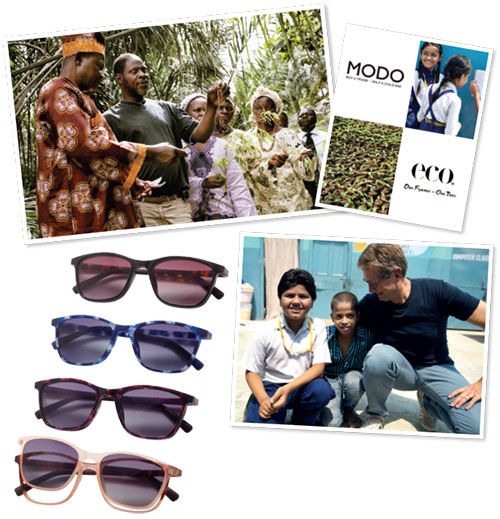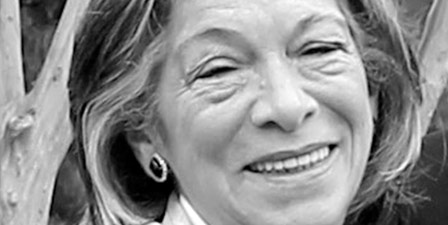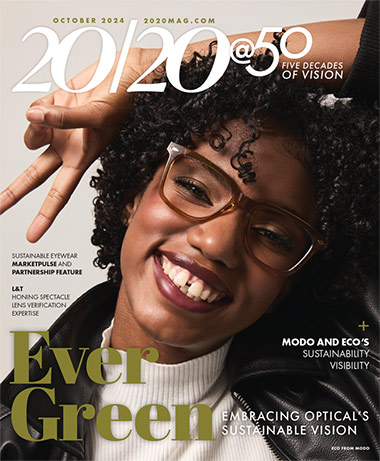
By Linda Conlin
Our digitally-amped world is shrinking. Events far beyond traditional borders are touching people and companies, and a courageous few are tackling the causes and effects of those events. They, in effect, have resurrected the John Donne missive, “No man is an island, entire of itself... Any man’s (loss) diminishes me because I am involved in mankind” and transformed it into a 21st century mantra.
For MODO president and CEO Alessandro Lanaro, the world beyond MODO’s Greenwich Village borders seemed only a reach away. One only needs to stretch out a helping hand to become involved.
Take eyewear, MODO’s raison d’etre. In lands of plenty, eyewear has bloomed from a prosthetic device into a fashion statement, but in much of the developing world, they remain prosthetic devices. More important, they are inaccessible prosthetic devices. Some 20 million children under 15 need eyewear but do not have access to eye exams or the devices themselves. This diminishes their ability to learn since 80 percent of a child’s learning experience is visual.
About five years ago, MODO started its Buy-a-Frame-Give-a-Frame program, but Lanaro wanted to do more. He reached across the seas and partnered with Seva Foundation, an ophthalmic nonprofit organization, and Dr. Shroff’s Charity Eye Hospital in the Darya Ganji section of New Delhi. The program, called Buy a Frame/Help a Child, will ambitiously provide eyecare to 200,000 children living in and around the hospital. For example, there’s Iqra, a fifth grader in New Delhi, India. She would sit in the back of the classroom, and the words and numbers on the blackboard appeared blurry. Under the MODO-Seva program, MODO makes a donation to Seva for each pair of MODO eyewear purchased. In other words, MODO’s retail customers enabled Iqra to receive an eye exam and to get eyewear. As she waited for her new eyewear, she said, “When I get my glasses, I’ll feel better.” Hers is no longer a loss but a gain. A hope is restored, and her learning process will quicken, all because of a pair of eyewear.
“It’s been a humbling, emotional and very positive experience,” notes Lanaro after going to New Delhi. “We are happy to be with this program. We are positive and optimistic of the change we can make. We understand how important it is for businesses like ours, and that brands like ours can make a positive impact in the world.”
Iqra is but one of 4 million people in more than 20 countries whom Seva has helped. It has trained local eyecare providers to develop self-sustaining eye programs. With partners like MODO, it assists these providers in giving eyecare to underserved communities. Caregivers visit schools, examine eyes and distribute free glasses to children, complete with a final exam to ensure clear vision. Teachers also invite families to the school, where the students and families learn about their children’s eye conditions and treatment.
A few years earlier, MODO launched an environmental program in coordination with its ECO eyewear. Lanaro has noted that ECO was the first brand created with the idea of sustainability and social responsibility. The ECO program is based on one simple principle: Look Good, Feel Good, Do Good. The MODO CEO explained that customers look good wearing innovatively designed eyewear. They feel good because 95 percent of the material used to make the eyewear is recycled or made of non-petroleum plastic. For example, 63 percent of the ECO eyewear is made up of sustainable, non-polluting castor seeds. “Do Good” is the company’s pledge to social responsibility. Through a partnership with Trees for the Future that started in 2009, it has helped plant more than 1.5 million trees in Cameroon, enough to remove two days’ worth of carbon dioxide in New York City.
The trees play an integral part of an agroforestry land use program run by Trees for the Future. It provides seeds for trees that are planted in nurseries. Specialists such as Kingsley Neba educate the farmers about agroforestry and bare-stem transplanting. With the help of school director Heleine Tsopmo, public schools such as Ecole Publique Dschang Renka Michel run agroforestry workshops for the children, the next generation of farmers. When the trees mature, farmers plant them in their fields. The trees improve the soil, which leads to higher crop yields.
MODO was recently honored with the Nana, Woody, and John Sustainability Award for its design of the ECO line and its work with Trees for the Future. “This award means a lot to us as it honors independent eyewear companies and their dedication to their customers; at ECO we care about our customers and the environment equally by creating and producing eyewear that our customers love and is good for the environment,” says a company spokesperson.
MODO started these programs as if it were ripping a page from a Millennial economic handbook.
Today the economic might of Millennials rivals that of the Baby Boomers in their heyday, and in a few years, Millennials will have the greatest purchasing power of all generations. A good number of Millennials see their purchasing power bringing an obligation. For them, social issues and the environmental issues play an important role. For example, some 48 percent try to purchase brands of companies actively supporting social causes, and 45 percent say that environmental stewardship is more important than it was two years ago, according to marketingprofs.com. In fact, more than a third purchase from companies that make contributions to social causes.
Most surprising, for all their Facebook and Instagram connections, they prefer the brick-and-mortar buying experience. The reason: They want value from their products like authenticity, local sourcing and ethical production, according to a Forbes article about the buying habits of Millennials. In other words, as Goldman Sachs reports, 59 percent of Millennials base brand loyalty on quality, not price.
In the end Millennials weigh the integrity of a company’s business model against their own values. And finally for the eyewear industry, they were born between 1981 and 1996. They are the emerging presbyopes.
It is for all these reasons that Lanaro can report: “Adding sustainability and social responsibility to a great collection like ECO was certainly a winning combination. We are humbled by the reception in the marketplace, and we are proud of our achievements. There is a great journey in front of us, and we are committed to keep on going!”
Connect with our MODO sponsored CE “Why You Should Know How Frames Are Made."












